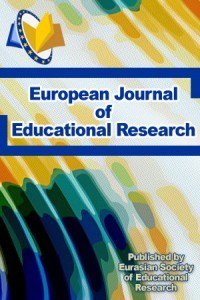Digital Learning Characteristics and Principles of Information Resources Knowledge Structuring
Digital Learning Characteristics and Principles of Information Resources Knowledge Structuring
Information resources, knowledge structuring, digital learning fuzzy semantic network, knowledge representation, higher education,
___
- Altbach, P. G. (2007). Introduction: The underlying realities of higher education in the 21st century. In P. G. Altbach, & P. M. Peterson (Eds.), Higher education in the new century: Global challenges and innovative ideas. Rotterdam/Taipei: Sense Publishers.
- Aliev R.A. (1990) Production systems with artificial intelligence / Aliev R.A, Abdikeev N.M, Shakhnazarov M.M - M.: Radio and Communication, - 264 p.
- Altbach, P. G., Reisberg, L., & Rumbley, L. E. (2009). Trends in global higher education: Tracking an academic revolution. Report prepared for the UNESCO2009 World Conference on Higher Education, Paris: United National Educational, Scientific, and Cultural Organization.
- Bridges, D., Juceviciene, P., Jucevicius, R., Mclaughlin, T. H., & Stankeviciute, J. (Eds.). (2014). Higher education and national development: Universities and societies in transition. London: Routledge.
- Buch G. (1992). Object-oriented programming / Buch G. - M.: Concord, - 519 p.
- Bushuyev, S., & Bushueva, N. (2010). Project Management. Fundamentals of professional knowledge and competence assessment system of project managers (National Competence Baseline, NCB UA Version 3.1).
- Bykov V., & Kucherenko V. (2005) Distance learning process: a tutorial [ed.]. - K: Millennium, - 292 p.
- Iegorchenkov, O. V., Lisitsyn, O. B., & Kataev, D. S. (2012). Optimization of information management in product design management system. Management of Complex Systems, 13, 28-31.
- Kukharenko V. V. (2001). Practice of distance learning: a manual. - Kharkiv: NTU "KhPI", - 124 p.
- Kravchenko Yu. V. (2009). Concept of the structure of the informational resource of the remote systems / Kravchenko Yu. V., Oksiuk OG // In the context of information technology in the sphere of safety and defense. - K.: - No. 1 (4). - P. 6-11.
- Kravchenko Yu. V. (2009). Mathematical model of a complex social system / Kravchenko Yu.V., Lobanov AA, Oksiuk AG // The material of the international scientific conference "Intellectual systems in making decidions and solving problems of the enumerative telecommunication (ISDMCI'2009)". - Kherson: KhNTU, - P. 56-57.
- Kravchenko Yu. V. (2003). Methodology of multicriterial discrete optimization of complex technical systems on matroid structures / Yu. V. Kravchenko, V. V. Afanasyev // Scientific Journal ІПМ в Еіі. G. Є. Puhov vip. 22 - 1. - K.: ІPМ в Е ім. G. Є. Pukhova - P. 73 - 78.
- Kravchenko Yu. V. (2010). The model of representation of knowledge on the basis of predicates and fuzzy semantic networks / Kravchenko Yu. V., Oksiuk AG, Andrushchenko VN // Materiels of the international scientific conference "Intellectual systems in making desicions and problems of the enumerative telecommunications" (ISDMCI '2010). " - Kherson: KhNTU, - P. 156.
- Tesla, J. M., Inosova, S. V., Timinskyy, O. G., & Iegorchenkov, O. V. (2010). Interpretation and use of the uncertainty principle in project management. Management of Complex Systems, 3, 33-36.
- ISSN: 2165-8714
- Başlangıç: 2012
- Yayıncı: Eurasian Society of Educational Research
Nuri BALTA, Mohammad Hamza AWEDH
Melissa A. ADELMAN, Miguel SZEKELY
The “MelArete” Project: Educating children to the Ethics of Virtue and of Care
Luigina MORTARİ, Marco UBBİALİ
Using Blogs to Improve Elementary School Students’ Environmental Literacy in Science Class
Fatih SALTAN, Omer Faruk DİVARCİ
Effect of Pedagogical Formation Program on Pre-Service History Teachers’ Perceived Self-Efficacy
